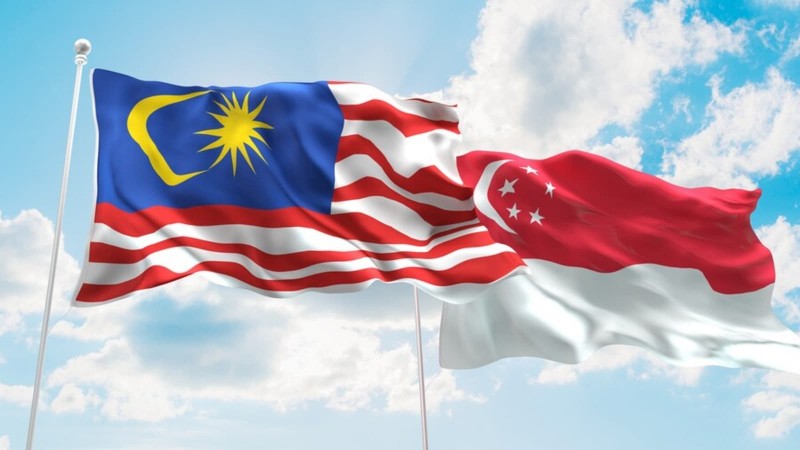
Image credit: Hindustan Times
KUALA LUMPUR, May 15 (Bernama) -- As Singapore's new Prime Minister Lawrence Wong takes office today, a key challenge will be elevating economic ties with neighbouring Malaysia, benefiting not just both nations but also the 10-member ASEAN bloc.
Strengthening these ties is crucial for maximising mutual potential and creating wealth for citizens amidst a hostile global environment that favours competitive economies.
By collaborating with Malaysia’s relatively new Prime Minister, Datuk Seri Anwar Ibrahim, Singapore -- an advanced nation, particularly in technology -- could attract global tech firms relocating due to the US-China trade and chip war.
The competition between the two giants has forced many global semiconductor firms to opt for safer destinations, with Malaysia and regional economies such as Singapore standing out.
If Putrajaya and the new Singaporean government develop new bilateral economic policies, they can easily offer both their countries as jointinvestment destinations to lure global semiconductor firms to Asean with strategic investments in Malaysia-Singapore including tech-giants from US and China.
This would be a major coup which will not only benefit Malaysia and Singapore, but Southeast Asia as well, something which Wong and Anwar along their respective team should seriously consider.
In so doing, the Malaysia-Singapore nucleus can be a magnet for attracting foreign direct investments into the Asean region, based on its combined populace of almost 700 million and being the third most populous region.
Rated sixth in the world for semiconductor exports, with RM575 billion sales in 2023, Malaysia reportedly has seven per cent of the global market share.
This surely makes it an attractive destination for investors which hunger for profits. And if Malaysia is promoted together with Singapore as a joint destination, it undeniably would raise its level of attractiveness for global investments.
Wong, 52, who is Deputy Prime Minister and Minister of Finance, will succeed Lee Hsien Loong, 72, who have served Singapore's government for nearly 20 years since on Aug 12, 2004.
Wong’s swearing-in ceremony will take place at 8 pm today at the Istana, the official residence and office of the president of Singapore.
Last Friday, Anwar said Malaysia is ready to continue strengthening relations with Singapore under Wong’s administration.
Malaysian Economic Association deputy president Professor Dr Yeah Kim Leng said greater collaboration between Malaysia and Singapore would also provide some sort of shield for both countries to overcome global risks that are seen in the horizon.
They include the slowdown in external demand, persistently elevated inflation and interest rates, and rising geopolitical tensions, no thanks to the spat between Washington and Beijing, the ongoing Ukraine-Russian war and the conflict in the Middle East.
Dr Yeah said Malaysia and Singapore have been complementing one another for decades, with its economies almost dependent on each other.
The island-republic has high labour costs, skills shortages and lack of manpower. Nevertheless, the republic’s healthy public finances with huge reserves offer it the springboard to chalk up high economic growth, he said.
Many of Malaysia’s exports go through Singapore, a significant number of Malaysians work in Singapore while there are many companies from both countries which do business in each others’ markets.
Against such a scenario, continuous bilateral relations pretty much is paramount for both countries and which have the potential to be further improved upon given the new dynamics in the regional and global economic arena, he said.
Recent statistics show that more than 1.18 million Malaysians are working in Singapore, while overall 1.8 million Malaysians are working in the region.
Putra Business School economic analyst Professor Madya Doctor Ahmad Razman Abdul Latif said that rather than competing with each other, working together “is a way forward for both Singapore and Malaysia.”
This is very critical in view of the challenging and volatile economic situation which in a way warrants economies to work together not only bilaterally but also regionally.
For more than a decade, Malaysia and Singapore have been each other’s second largest global trading partner and the largest among Asean countries.
In 2023, total trade between the two countries was valued at RM363.13 billion (US$79.6 billion).
Singapore and Malaysia will celebrate 60 years of bilateral relations next year
Besides Malaysia and Singapore, Asean member countries include Indonesia, Vietnam, Laos, Brunei, Thailand, Myanmar, the Philippines, and Cambodia.
Source: https://www.bernama.com/en/news.php?id=2297767

